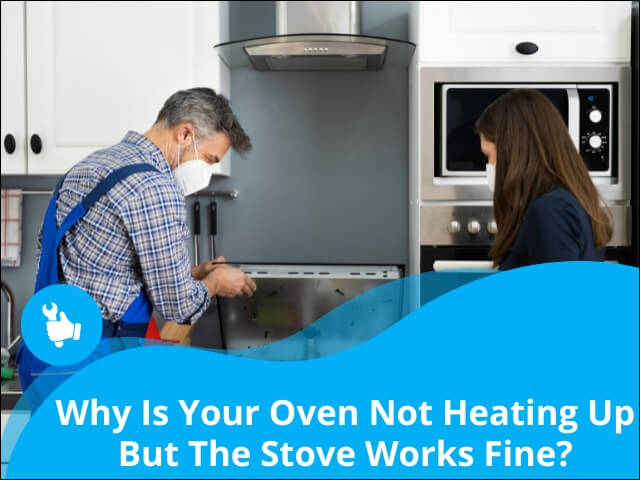Are you shaking your head in dismay because your oven is not heating up but stove works? Indeed, this is often an annoying problem with Kenmore range, but they are generally reparable, albeit confusing. Whether it be gas or electricity, a kitchen range’s oven and stove are powered by the same source. Why would this strange problem be so prevalent when both components are essential to a self-sufficient appliance?
If your stove is heating up normally, but the oven is not, the problem likely lies with the oven’s heating element. Every component of the oven’s heating system (burners, heating elements, igniters, limit switches, temperature sensors, thermal fuses, etc.) is designed to work together to keep the oven going. Because of a malfunctioning critical component, the oven will fail to catalyze heat.
Electric ranges have heating elements emitting a bright red flame on the stovetop and inside the oven. Meanwhile, gas ovens have a pilot light that gets its heat from the gas supply itself. It only takes a quick visual inspection to tell you what kind of oven is malfunctioning. Below, we will check out a situation where the oven is not working.
A Malfunctioning Oven with a Functioning Stove: How Does It Happen in Electric and Gas Units?
The oven’s heating elements or burners are analogous to the stove on your range. These parts are not linked to the stove in any way.
The bake and broil functions in an electric oven connect to the control board that works independently. Thus, it does not matter if the heating elements in your stovetop are functional because the oven’s wirings may experience damage and other connection issues, affecting the link between essential components.
In a similar fashion, each burner in a gas oven has its own electronic igniter and shutoff valve. Once the igniters, safety valves, and other crucial oven parts fail, it would not automatically mean that it also renders your stove unusable.
Other times, gas and electric ovens may face continuity problems with the circuit, but not the stove. Gas and electric ovens have complex circuits that link all of their individual parts together. Due to a break in the circuit, the electrical current cannot reach the oven’s components.
It affects these oven parts:
- thermostat
- limit switch
- electronic control board
- heating elements for electric ovens
- igniters for gas ovens
- safety valves for gas ovens
How to fix an electric and gas range oven not heating up?
Before trying out any first-aid repair at home, ensure you know the precise culprit. Otherwise, you may only end up doing more harm than good to your Kenmore kitchen range. We recommend that you avail of our Kenmore range repair if you do not want to touch anything on your range oven.
Determine Which Component Is Broken and Go for a Replacement
Irreparable components in ovens are temperature sensors, heating elements for electric units, and igniters and shutoff valves for gas units. If they are broken or seemingly hopeless, hire our professionals for a safe and effective replacement process.
Clean the Oven’s Crucial Components
An oven’s ability to function properly is compromised as grime and coal dust build up, leading to a complete loss of power to the heating elements or burners.
On the other hand, if a temperature sensor or igniter is dirty, its performance may suffer. Wipe it down using sandpaper, including the spark plugs and if you have a gas oven. Do not forget the heating elements!
Tighten Loose Connections and Swap Out Bad Wiring
This applies to your electric circuit, where wires often get frayed or loosened. Homeowners may fix it by simply tightening the unsecured wiring. But if you find damaged wires, this could affect the continuity, and a replacement is necessary.
Remember that Kenmore Best Appliance Repair Pro always has your back for all your Kenmore appliance needs. Never have any qualms about letting us handle your concerning appliances any day.
Call and Work with Us Today!
Do not hesitate to read more of our blogs at Kenmore Best Appliance Repair Pro if you need more insights on maintaining your kitchen range. Or, you may contact us directly for urgent concerns.
